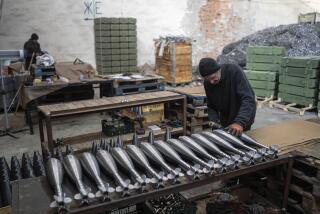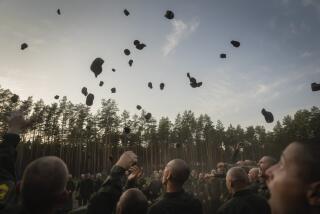NEWS ANALYSIS : Yugoslav Military Probably Lacks the Will and the Means for a Coup : Balkans: Still, the only federal institution that retains meaningful national authority is the armed forces.
BELGRADE, Yugoslavia — In its current state of violent disintegration, if Yugoslavia were a Latin American country there would be a pool in every office to guess the date of the coup.
But no coup is in prospect here, in the unanimous judgment of Yugoslav analysts, diplomatic observers and army officers themselves. The armed forces lack both the will and the means to take charge of the hate-filled Balkan federation, the analysts say.
“The time when the army might have risen up in the name of a national solution is long gone. It is too late now,” said one senior diplomat.
“The army couldn’t stage a coup because it is an ivory tower institution that lacks the ability to run the country. Its officers are absolutely privileged and have almost no connection with civilian life. They couldn’t run the economy or social system,” said Milos Vasic, a military analyst at the liberal magazine Vreme.
If such analysis is correct, then there is no chance that battling Serbs and Croats can be yanked back into order at Yugoslav initiative--however painfully--because the military is the only federal institution that retains meaningful national authority, however currently diminished.
Which leaves the European Community’s long-shot peace effort as the sole hope of halting bloodshed between two neighboring communities that show a greater disposition to fight than to talk.
Strapped for money and men, the armed forces are one of the principal victims of the violent rebirth of old ethnic hatreds that are tearing Yugoslavia apart.
Now, by all accounts except their own, Yugoslavia’s soldiers cannot be potential arbiters in the political flux because they have joined the game as one of the players.
In bloody Croatia, army units are deployed in an ostensible attempt to keep Croat and Serb forces apart. The army denies it, but the Croats, the Europeans and international reporters in the field all say that army units have been supporting violent land grabs in Croatia by Serbian irregulars.
The irregulars, representing the Serb minority in Croatia, have vast stocks of weapons: outgunned Croatia and independent sources say they have been supplied by the army. When irregulars advance, army units are never far away, and in a number of Croatian cities, the irregulars moved in behind the army, according to independent witnesses.
“The army has compromised its federal identity by arming and supporting Serbian irregulars,” said Vasic.
Not true, avers army spokesman Col. Milan Gvero: “Serbian forces are acting beyond our control,” he says.
Yugoslavia’s implosion has been divisive and disillusioning for an armed institution that says it is adjusting to new democratic rules but whose critics charge is the last Communist army in Europe.
“For 45 years, we successfully achieved what we were trained to do: to defend our borders. We never dreamed of a situation in which we would oppose our own people,” Gvero observed during a lengthy conversation one day last week.
When Marshal Josip Broz Tito broke with Moscow in 1948, his dream of forging an independent-minded Communist state was guaranteed from Soviet reprisal by a Yugoslav army hewn from the gritty veterans of World War II partisans.
Times have changed. Noted Gvero: “Now, we are not protecting the country from external enemies but from disintegrating internal forces. We are not prepared for such a task. We are also faced by federal inefficiency and a lack of funds. No matter what we do, we are attacked. Even if we sat still, we would be attacked. They attack us not because of what do, but because we exist in their territory.”
For every Croatian accusation of army intervention, there is an army counter-charge of armed Croatian attacks on army facilities and harassment of officers and their families stationed in Croatia.
Since the collapse of communism, the army, which once counted around 200,000 men but is now thought to be much smaller, has endured great erosion of its national authority.
Now, it is grappling for its identity. Will it remain a national force, and in what kind of country? Or will it, as some predict, become Serbia’s army?
The overwhelming majority of the army’s estimated 70,000 professional officers and noncoms are Serbian. All were weaned on communism; many of them come from families with painful World War II memories of Croats slaughtering Serbs on behalf of a Nazi Quisling state.
In Yugoslavia’s present disarray, the army has been weakened financially by the refusal of citizens and the nation’s six republics to pay taxes and cost-sharing to the moribund federal government.
Its manpower pool is dramatically diminished. Only two of the six republics, Serbia and Montenegro, are fully supporting annual draft calls this year, and Belgrade, the national and Serbian capital, bubbles with stories of young Serbs living underground to avoid conscription or reserve call-ups.
The army has been psychologically wounded by political agreement that has forced it to abandon the alpine republic of Slovenia, which, with Croatia, has declared independence.
Like the country it represents, the army lacks a clear national vision for the future: constitutionally, its supreme commander is not an authority figure with decision-making powers but a marshmallow collective eight-man national presidency whose members despise one another.
In January, recalls Gen. Marko Negovanovic, former chief of army intelligence, the army asked the presidency for authority to disarm all illegal paramilitary units in Croatia--both sides. “The decision was not made,” Negovanovic told reporters last week.
By some accounts, there is a generation gap within the army between younger officers who prefer Yugoslav cohesion and their older superiors who share hard-line Serbian President Slobodan Milosevic’s dreams of a Greater Serbia.
“For a time, it looked as if the army would support the federal government, but instead it succumbed to Milosevic,” said Vasic. “When the choice was to let communism go and save Yugoslavia, they instead opted for Milosevic, the last Communist left.”
Again, Gvero demurs. The army, he says, has outgrown its Communist past like the rest of Yugoslavia. For the national future, it will accept “any democratic solution achieved without bloodshed and force.”
There is an old saying in Yugoslavia, Gvero said: “ ‘Guns can bring power, but you can’t sit on guns for very long.’ Any military solution is not a solution. The army does not want to interfere.”
Assertions of democratic intent are as ubiquitous in Yugoslavia today as fresh graves. Amid their unfulfilled promises, however, the absence of a national commitment to control ethnic hatreds is leading Yugoslavia, and its army, toward a cataclysmic civil war that may consume both of them.
More to Read
Sign up for Essential California
The most important California stories and recommendations in your inbox every morning.
You may occasionally receive promotional content from the Los Angeles Times.










